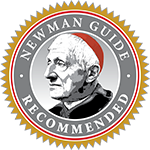The Human Person: Created, Fallen, and Redeemed
Explore the classical, Christian vision of full human flourishing. This course proceeds from the perspective of natural law and thus sees human persons as a unity of body, soul, rational intellect, will, and passions who are created to find happiness in freedom through virtue and called by God to particular vocations. It also examines related dimensions of emotions and experience. Students will learn the dynamics of this integrative, holistic, and transformative vision in its biblical, theological, and philosophical grounding, as well as its embedding in biological, psychological, and socio-cultural contexts.
Human Flourishing in Life and Implications for Clinical Practice
Encounter models for the integration of the Christian vision of the human person into life in general and counseling praxis in particular. Drawing on the theological, philosophical, and psychological foundations of Catholic anthropology, the course examines the human, religious, and spiritual resources necessary for the mature discernment of vocation, the free exercise of virtue, the operation of reason, the cultivation of healthy relationships, the process of personal growth, the avenues of healing, and, ultimately, growth in faith, hope, and love.
Caring for the Human Person: Towards an Integrated Practice
Examine the emotional, passional, rational, sensory-perceptual, and cognitive dimensions of the human person. This course involves deep exploration of the integration of the theological, philosophical, and psychological grounding of the Catholic vision of the human person into aspects of clinical practice such as psychological evaluations and assessments, case conceptualization, and ongoing counseling of clients.
Holistic Flourishing and Integration
Engage in the Christian vision of the human flourishing in terms of its conviction that the human person is an integrated unity designed to live in mutually enriching relationships with God and other persons in true freedom and happiness. Particular diagnoses, such as depression and anxiety, are considered from psychological, theological, and philosophical perspectives with a view towards the proper understanding of Catholic anthropology and its successful integration into clinical practice for the sake of client growth, healing, and flourishing.
Vocation and Virtue as Man and Woman
Reflect upon the nature and discernment of particular vocational states in life, asking what it means to receive and thrive in a call to be single, married, ordained, or consecrated. This course makes note of the comprehensive union of male and female in marriage as a natural and sacramental institution divinely ordained for the good of children, adults, families, and societies from the perspective of Catholic teaching as shaped by classical, legal, philosophical, biblical, and theological sources. The course involves the analysis of issues pertinent to clinical practice such as disorders and difficulties related to singleness, romance, marriage, and family.

